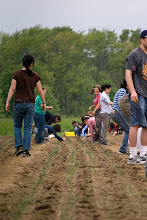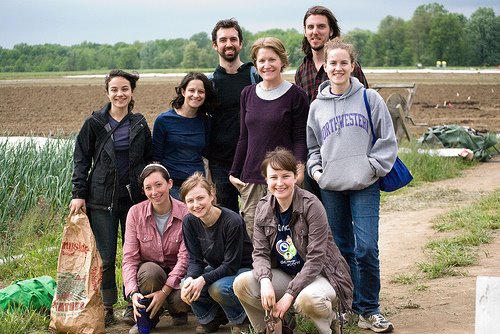Watch out bugs! Here comes the Row Cover Queen!
If I were to ask you, ‘Who are the greatest foes of organic farming?’ You might automatically start thinking really big. ‘Well there’s the industrial food system, that produces cheap food using pesticides and herbicides.’ Or maybe, you’d think about Monsanto, one of the premier chemical-pushers of modern agriculture, and also the genius behind tons of GMO crops. These giants do their own damage to our food system, but from day-to-day the organic farmer is often concerned with much smaller foes like the Colorado potato beetle, the cabbageworm, the flea beetle, and the cucumber beetle. Though these guys are small they can wreak havoc on your crops turning a tasty bed of arugula greens into an unsightly mess overnight. And that’s where Reemay (or floating row cover, a white super light weight fabric) and I get involved.
At the beginning of the season we were all designated a different ‘area of specialization’. During the week when we aren’t harvesting you’ll see B.R. ripping around on the electric G (one of the specially rigged tractors) cultivating between plants, Devin dragging around different hoses & drip tape for our irrigation, or Miriam plowing a section of field for planting. I was given the title of Row Cover Queen. I already knew that Reemay could protect crops from insects, but was a little unclear as to which crops should be covered when, and for what reasons.
Here are a few bits of information I’ve gathered in the last month. You can plant eggplant and tomatoes a little earlier in the season if you both plant them into black plastic, and cover them with Reemay. Both of these help trap the sun’s heat in the soil, and especially if a late frost is coming you’ll want to cover anything that’s sensitive to cold. So while Solanaceae (nightshades) need to be covered to mimic a warmer climate, Brassicaceae (broccoli, cabbages, radishes, & arugula), which prefer the cooler summer and fall have to be covered because they’re the favorite food of both flea beetles, and cabbage, worms. Just remember you’ll need to uncover any flowering plants so bees can pollinate them. Seems like every family of vegetables has its corresponding six-legged muncher. There’s thousands of them and only one of me, but when your arugula arrives with only a few holes, for one you’ll know its pesticide-free, and second that I’ve been carrying soil bags and unfurling Reemay left & right to keep your veggies warm, snug, and relatively bug free.
Thursday, July 2, 2009
Subscribe to:
Post Comments (Atom)




No comments:
Post a Comment